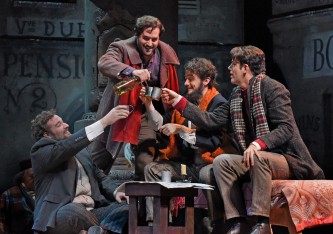
‘La Boheme’ survived, and even thrived, with a last-second replacement. (Photo by Karen Almond for Dallas Opera)
The fourth opera in Dallas Opera’s season, Puccini’s timeless tale of tragic love La Boheme, is one of the most popular in the standard repertoire: There’s nary a singer out there who doesn’t know the score from heart. That’s a good thing, since before Wednesday night’s performance, lead tenor Bryan Hymel (who plays Rodolfo) had fallen ill and was replaced by Dimitri Pittas, who apparently arrived in Dallas from New York just hours before curtain.
If there was panic backstage, it wasn’t apparent from the seats of the Winspear, which presented an engaging performance overall.
The four-act opera revolves around four artists in Paris. Rodolfo, a poet, and painter Marcello (portrayed with passion and sensitivity by baritone Jonathan Beyer) struggle to stay warm in their freezing Paris apartment on Christmas Eve. They are joined by their friends, philosopher Colline (fine bass Alexander Vinogradov) and Schaunard (charmingly portrayed by baritone Steven LaBrie). Schaunard the musician has just returned from an odd but well-paying gig and has the cash to treat them to a night of fun.
Most leave for a festive dinner at Café Momus, but Rodolfo stays behind to finish his writing when he meets Mimi (soprano Ana Maria Martinez), a fragile neighbor whose candle has blown out. In classic operatic fashion, they fall instantly in love, yielding three of the most beautiful arias in Italian opera. But as we all know, the course of true love does not run smoothly.
Puccini’s music is iconic, but the weaker singer in the duo is Martinez. Her warbling voice distracted from the gorgeous “ Si. Mi chiamano Mimi,” whereas Pittas’ “Che gelida manina” and “O soave fanciulla” are first-rate.
After Rodolfo and Mimi join the others at Café Momus, the group enjoys a fine meal until Marcello’s former love, the flamboyant Musetta (in a fine dress from the late costume designer Peter J. Hall), arrives on the scene with her rich older lover. Musetta (very strong DO debut from soprano Davinia Rodriguez) notices Marcello ignoring her, so she decides to serenade strangers about her beauty “Quando me’n vo” to get his attention. She succeeds, and they reunite.
In the beginning of the final act, the dark looming threat of Mimi’s demise is lifted up by a lively duel with breadsticks among the four friends. Musetta then brings a very ill Mimi to the flat, and everyone scrambles to sell what they can to help pay for Mimi’s medical care. Colline shines in his farewell to his old coat “Vecchia zimarra, senti.” But this story does not end happily, and the slow final curtain adds to the drama.
Conductor Riccardo Frizza and director Peter Kazaras make competent, if not memorable, DO debuts (the stage work especially was listless). The lighting design by Thomas C. Hase was effective, particularly in the final act. It’s not their best work, but this revival of a Dallas Opera production still has the chops as a quintessential night at the opera.
Runs through March 29 at the Winspear Opera House with a simulcast at AT&T Stadium March 21.
— Alicia Chang















